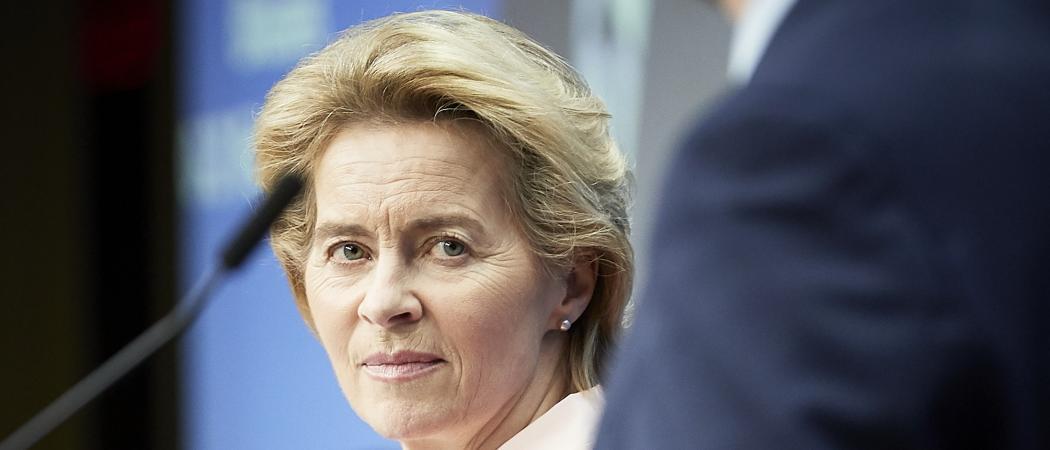Horizon Europe ‘will be strengthened’, after research spending ‘proves its worth’ during COVID-19 crisis, von der Leyen tells MEPs

Ursula von der Leyen. Photo: European Commission
There is to be more money for research in the EU’s coronavirus recovery budget, European Commission president Ursula von der Leyen told MEPs on Wednesday saying, “We will strengthen programmes that have proven their value in the crisis, such as Horizon Europe.”
The expectation among Brussels sources is that von der Leyen is talking about a few billion euros more for the research programme, which starts next year and runs until 2027.
The money will come from the recovery cash pot in the EU’s revised seven-year budget, designed to rescue the continent from the economic carnage brought about by COVID-19.
Horizon Europe was originally slated to receive €94.1 billion when it was drawn up in 2018, a rise from €77 billion in the current Horizon Europe programme, which ends in December 2020.
The prospects of the forthcoming programme have risen and fallen in negotiations over the past two years, with one recent EU budget meeting among member states placing the total for research at under €87 billion. The president’s words on Wednesday, and the words of the research commissioner last week, raise expectations that the €94.1 billion figure will be safeguarded – and added to.
Von der Leyen sketched out the main elements of her reworked budget to MEPs. The full details of the budget, which will lean heavily on financial guarantee schemes and massive borrowing, are expected next week.
Addressing concerns that the recovery budget would solely involve complex financial architecture, von der Leyen said, “there will also be grants,” adding, “and [the budget] will include the possibility to front-load investment this year.”
A fast injection of cash is widely seen as a must if Europe is to head off a long, entrenched decline. The commission wants to set loose vast amounts of money, upwards of €1 trillion.
Among the new features in the redrafted budget, von der Leyen said there is to be a dedicated health programme, with the commission keen to carve out a bigger role for itself in overseeing the crisis preparedness level of healthcare systems. If member states agree, this would reverse the slow bleed of EU health powers, and the decision of the previous administration under Jean-Claude Juncker to consolidate health spending with several other programmes.
Regional subsidies will be topped up for countries, based on the “severity of the crisis” they’ve faced, the president said. That puts Spain and Italy in line to receive additional funding.
This move is to allay concerns about the ability of poorer EU member countries to support their industries through the crisis, while countries such as Germany and France offer huge financial assistance for national champions.
“The virus is the same in every member state, but the capacity to respond and absorb the shock is very different. We’re observing an un-levelling of the playing field,” said von der Leyen.
A new EU strategic investment facility to invest in strategic areas, such as the development and manufacturing of antibiotics, raises the unusual possibility of the commission taking equity stakes in companies. “Europe must be able to produce critical medicine itself,” said von der Leyen.
The crisis has exposed a heavy reliance on foreign suppliers, with almost three quarters of all anticoagulant drugs imported by Italy coming from China; the same is true for nearly half of all antibiotics imported by Germany, Italy and France.
Financially sound companies, which find their budgets in tatters following lockdowns, will get solvency support, von der Leyen said.
The president also reiterated she intends to carry on with her flagship policy, the Green Deal, despite calls from some to shelve the proposal while huge uncertainties continue to confront the global economy, from the speed of reopening, to the scope of testing and timing of a vaccine.
“Sooner or later we will find a vaccine for coronavirus. But there is no vaccine for climate change. Therefore Europe needs a recovery plan designed for the future,” von der Leyen said.





 A unique international forum for public research organisations and companies to connect their external engagement with strategic interests around their R&D system.
A unique international forum for public research organisations and companies to connect their external engagement with strategic interests around their R&D system.